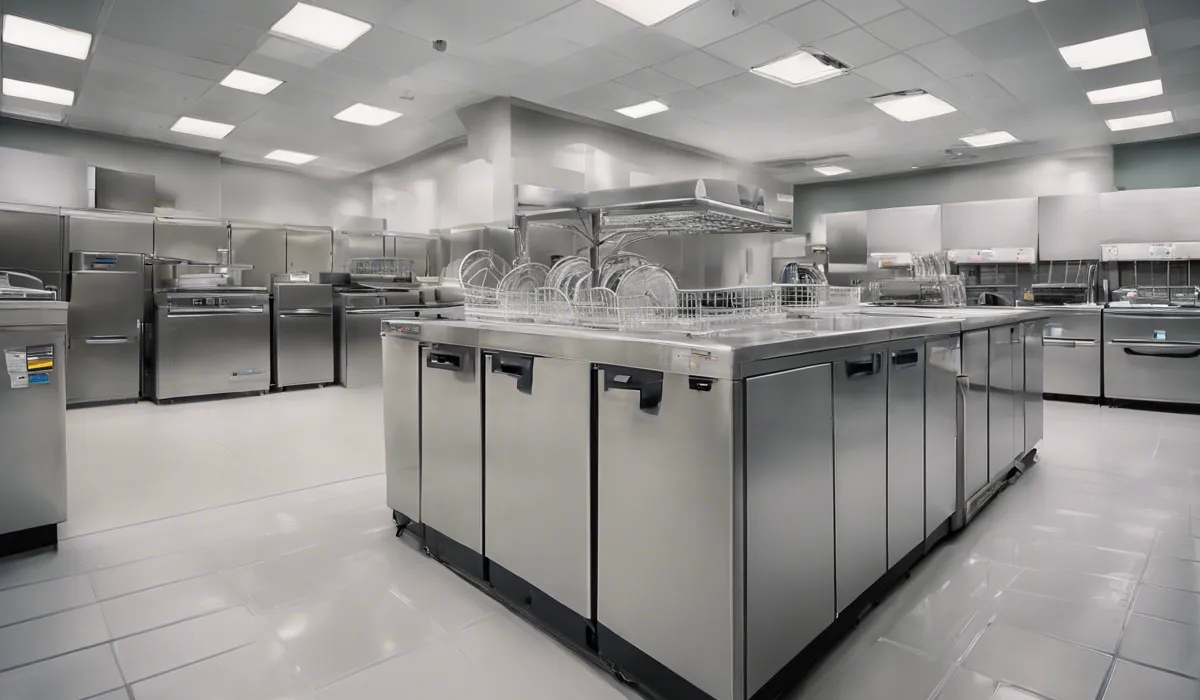When Purchasing A Dishwasher A Manager Can Tell
When buying a dishwasher, a manager can inform you about energy efficiency, cycle options, noise levels, and warranty terms. They can also guide you on installation services and after-sales support.
Assessing the Needs of the Establishment

Capacity and Business Volume
When diving into the complexities of a commercial kitchen, understanding the capacity requirements for the business is paramount. A bustling restaurant will have vastly different needs compared to a small cafe.
It is crucial to estimate the number of dishes that will flow through the kitchen during peak hours. This estimation ensures that the selected dishwasher can handle the workload without causing a bottleneck.
Dish and Utensil Variety
Considering the types of dishes and utensils to be washed is just as important as the volume.
A dishwasher fit for a pizza shop, which primarily handles flat, round trays, differs from one suitable for a fine dining establishment with a variety of delicate glassware and silverware.
It’s essential to choose a machine that can accommodate the various shapes and sizes of dishes used in the establishment.
Kitchen Space Allocation
Evaluating space constraints within the kitchen area is often overlooked but is a crucial step in the selection process.
The physical footprint of the dishwasher must fit seamlessly into the kitchen’s layout, without disrupting the flow of operations.
This could mean opting for a compact undercounter model if space is at a premium or a larger conveyor type if the area permits.
Turnaround Time for Clean Dishes
Lastly, analyzing peak hours and required turnaround times for clean dishes can make or break a kitchen’s efficiency.
A high-speed dishwasher can be an invaluable asset during a lunch rush, ensuring a continuous supply of clean dishes. Assessing the speed and cycle duration of potential dishwashers will help maintain a smooth operation during these critical times.
Identifying Key Dishwasher Features

Dishwasher Types for Different Needs
Exploring different types of dishwashers is the first step in pinpointing the right fit for your kitchen.
Undercounter models are ideal for smaller establishments, while door-type or conveyor dishwashers might better serve medium to large-sized operations.
For high-volume environments, a flight type dishwasher offers maximum efficiency. Each type caters to specific operational needs and should be chosen accordingly.
Energy Efficiency and Water Usage
Examining energy efficiency and water usage is critical, not only for reducing operational costs but also for adhering to environmental standards.
Energy Star-rated dishwashers can significantly lower utility bills and are better for the planet. It’s important to consider how much water and electricity a dishwasher uses per cycle to gauge its overall impact on your bottom line.
Sanitation Standards
Reviewing sanitation standards and certifications ensures that the dishwasher will meet health regulations. Look for models that boast NSF certification, indicating they achieve a certain level of sanitation during the wash cycle.
This is not just a matter of compliance, but also a commitment to the health and safety of your customers.
Customization and Technology
Modern dishwashers come with a variety of features designed to make the cleaning process more efficient.
Adjustable racks and cycle customization options allow for a more tailored approach to dishwashing, accommodating different types of loads.
Soil sensors and other advanced technologies can optimize water usage and ensure that dishes come out spotless every time.
Maintenance and Repair
Determining the ease of maintenance and repair services is essential for keeping the kitchen running smoothly.
Dishwashers with easily accessible parts and straightforward design will be easier to maintain and fix, which keeps downtime to a minimum.
It’s beneficial to choose a dishwasher with a strong track record of reliability and a good warranty to protect your investment.
Cost-Benefit Analysis and Making the Purchase

Initial Purchase Price vs. Long-Term Savings
Comparing the initial purchase price with long-term savings is a delicate balance. The most affordable dishwasher might not be the most cost-effective in the long run if it consumes more energy and water.
It’s important to consider the lifespan of the equipment and how much it will cost to operate daily.
Operational Cost Estimation
Estimating operational costs, including water, energy, detergent, and maintenance, gives a clearer picture of the total cost of ownership.
It is essential to calculate these recurring expenses to ensure that the dishwasher is a sound investment that won’t drain resources over time.
Warranty and Customer Support
Considering warranty options and customer service support is vital when purchasing a commercial dishwasher.
A comprehensive warranty can save significant money on repairs, while reliable customer support can help quickly resolve any issues that may arise.
Financing and Tax Incentives
Evaluating financing options and potential tax incentives can make a high-quality dishwasher more attainable.
Many suppliers offer financing plans to spread out the cost, and some energy-efficient models may qualify for tax credits or rebates, further reducing the overall expense.
Final Decision and Supplier Relations
Making the final decision based on a balance of features, performance, and price leads to a wise investment.
Once you’ve weighed all the factors, choose a dishwasher that meets your establishment’s needs without exceeding your budget.
Establishing a relationship with a reputable supplier or manufacturer can provide peace of mind and ensure you have access to the best products and services.
FAQs About Purchasing a Dishwasher
What can a manager tell me about a dishwasher’s energy efficiency?
A manager can inform you about the energy efficiency rating of a dishwasher and how it translates to energy savings and environmental impact.
What should I know about dishwasher cycle options?
A manager can explain the various cycle options available on a dishwasher, including eco-friendly cycles, quick wash options, and heavy-duty cycles for tougher loads.
How can I find out about the noise levels of a dishwasher?
A manager can provide information on the decibel level of dishwashers and what you can expect in terms of noise during operation.
What warranty terms should I be aware of when buying a dishwasher?
A manager can outline the warranty terms, including the length of the warranty, what is covered, and any additional service plans available for your dishwasher.
Can a manager help with dishwasher installation services and after-sales support?
Yes, a manager can guide you on installation services, including whether they are provided by the store or a third party, and what after-sales support options are available for your new dishwasher.
Final Thoughts
A manager is a valuable resource when purchasing a dishwasher, offering insights into energy efficiency and various cycle options.
They can also provide details on the unit’s noise levels, warranty specifics, and aid with installation services.
Furthermore, they’re instrumental in discussing after-sales support to ensure a satisfactory customer experience post-purchase.





